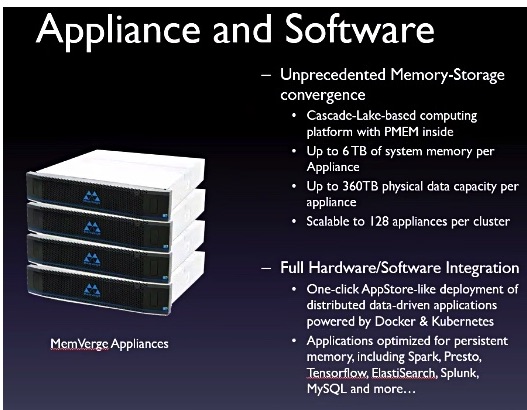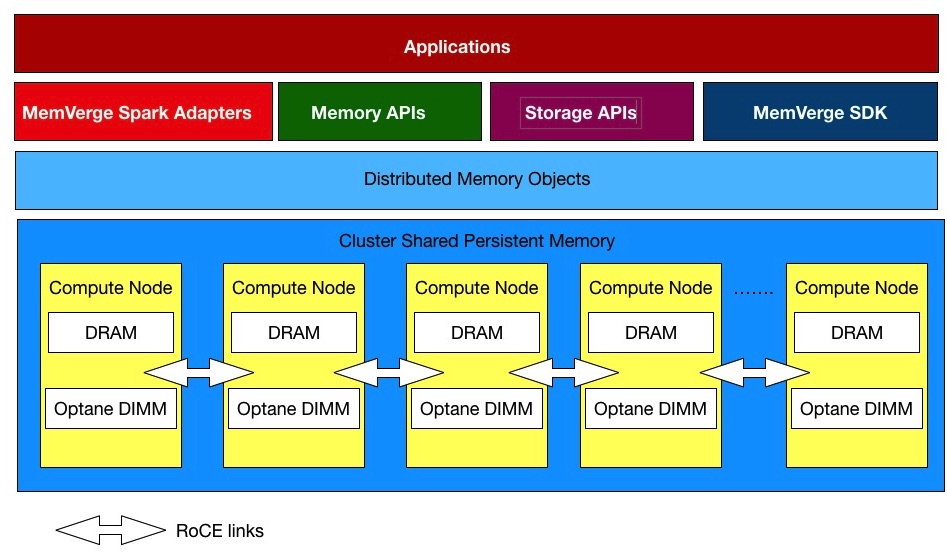MemVerge Fueled by $24.5 Million Series A
Out of stealth mode start-up in "memory-converged infrastructure" built with Intel Optane DC
This is a Press Release edited by StorageNewsletter.com on April 8, 2019 at 2:24 pmMemVerge, Inc., the inventor of Memory-Converged Infrastructure (MCI), emerged from stealth with $24.5 million in series A funding.
The investment from Gaorong Capital, Jerusalem Venture Partners, LDV Partners, Lightspeed Venture Partners, and Northern Light Venture Capital will be used to expand engineering, sales and marketing teams in Silicon Valley and to accelerate R&D to advance the development of MCI technology.
In a separate release (see below), the firm announced the beta launch of Memory-Converged system to power applications in an era where the ubiquity of machine-generated data characterizes modern enterprise IT workloads.
Executive team:
 Shuki Bruck, co-founder and chairman, is the Gordon and Betty Moore professor of Computation and Neural System and Electrical Engineering at the California Institute of Technology (Caltech). He was the founding director of the Caltech Information Science and Technology (IST) program. He co-founded and served as chairman of the technology companies XtremIO and Rainfinity.
Shuki Bruck, co-founder and chairman, is the Gordon and Betty Moore professor of Computation and Neural System and Electrical Engineering at the California Institute of Technology (Caltech). He was the founding director of the Caltech Information Science and Technology (IST) program. He co-founded and served as chairman of the technology companies XtremIO and Rainfinity.
 Charles Fan, co-founder and CEO, was formerly CTO of Cheetah Mobile leading its global technology teams, and an SVP/GM at VMware, founding the storage business unit that developed the Virtual SAN product. He also worked at EMC and was the founder of the EMC China R&D Center. He joined EMC via the acquisition of Rainfinity, where he was co-founder and CTO.
Charles Fan, co-founder and CEO, was formerly CTO of Cheetah Mobile leading its global technology teams, and an SVP/GM at VMware, founding the storage business unit that developed the Virtual SAN product. He also worked at EMC and was the founder of the EMC China R&D Center. He joined EMC via the acquisition of Rainfinity, where he was co-founder and CTO.
 Yue Li, co-founder and CTO, worked previously as a senior post-doctoral scholar in memory systems at the Caltech. He has extensive research experience on both theoretical and experimental aspects of algorithms for non-volatile memories. His research has been published in journals and conferences on storage.
Yue Li, co-founder and CTO, worked previously as a senior post-doctoral scholar in memory systems at the Caltech. He has extensive research experience on both theoretical and experimental aspects of algorithms for non-volatile memories. His research has been published in journals and conferences on storage.
“As more IT organizations look to leverage next generation big data analytics in a more real-time manner to drive better business optimization and planning, it’s clear that existing storage technologies are falling short of the performance requirements,” said Eric Burgener, research VP, infrastructure systems, platforms and technologies group, IDC. “With burgeoning persistent memory technologies now becoming available from vendors like Intel, it was inevitable that someone would come up with a storage operating environment specifically designed to run in persistent memory, and that is what storage start-up MemVerge has done. The vendor’s Distributed Memory Objects technology promises to meet the requirements of next generation analytics workloads with lower latencies, more predictable performance at scale, expanded capacity, improved efficiencies and better reliability.”
Every day 2.5 quintillion bytes of data are created at an accelerating pace given the deluge of machine generated data from AI/ML, IoT and analytics applications. These high-performance workloads require an infrastructure that can process the constant flood of data produced by the on-demand economy. This presents a compounding challenge for enterprise teams as well as data scientists at web giants and large enterprises who until now were forced to choose between having speed over higher capacity computing memory, or vice versa, when trying to run the most demanding data-centric workloads. MemVerge’s MCI system solves these challenges by delivering memory and storage from a single distributed platform while integrating seamlessly with existing applications. It provides 10X more memory size and 10X data I/O speed than storage and compute solutions.
“The explosion of machine generated data has created a massive opportunity for enterprises to gather actionable real-time insights and streamline business processes. However, AI, machine learning, IoT and data science applications place extreme demands on current IT infrastructure – workloads are prone to slowing or failing. Until now, most enterprises had to choose between more speed or more capacity, which didn’t solve the problem,” said Bin Yue, founding partner, Gaorong Capital. “MemVerge has taken this need head-on. The company has a massive opportunity in being the first to market with a commercial Memory-Converged infrastructure system.“
“The transformation of the data center is long overdue,” said Fan. “By eliminating the boundaries between memory and storage, our breakthrough architecture will power the most demanding AI and data science workloads today and in the future at memory speed, opening up new possibilities for data intensive computing for the enterprise.”
Read also:
Stealthy Start-Up MemVerge Discovered
In software that will empower seamless convergence of main computer memory and storage using single pool of non-volatile RAM
by Jean Jacques Maleval | November 22, 2018 | News
Other news:
MemVerge Memory-Converged Infrastructure to Power AI and Data Science Enterprise Workloads
Eliminates boundaries between memory and storage
MemVerge, Inc. launched from stealth and introduced a first system that eliminates the boundaries between memory and storage to power the demanding data-centric enterprise workloads.

Developed by the creators of all-flash and HCI solutions, the solution delivers memory and storage services from a single distributed platform while integrating seamlessly with existing applications so that enterprises can process the constant flood of machine-generated data produced by the on-demand economy. Built with Intel Optane DC persistent memory technology, a new product that collapses the memory-storage barrier at the hardware layer, MCI system offers 10X more memory size and 10X data I/O speed compared with current compute and storage solutions in the market.
Companies are using MemVerge to train AI models faster and to run complex workloads with more predictability using fewer resources.
“Data-intensive applications are pushing traditional enterprise infrastructures beyond their limits, especially as organizations scramble to incorporate next-generation technology like AI into their businesses. Edge environments are struggling to keep up, between demanding capacity and processing requirements, the speed at which data must be moved, and the management of all of it,” said Mike Leone, senior analyst, Enterprise Strategy Group. “Combining the power of new persistent memory with a modern hyperconverged infrastructure, MemVerge’s Memory-Converged Infrastructure offers a compelling solution for the field of AI and machine learning at the edge, making it possible to meet the real-time requirements of next-generation workloads while satisfying the fast-paced, dynamic needs of the business.”
Memory-Converged Infrastructure Puts Persistent Memory into Enterprises

With this MCI architecture, enterprises can have both higher capacity computing memory and faster storage at the same time, removing two of the biggest bottlenecks in the processing of machine-generated data. This new architecture is critical for the current and future success of the growing number of data-intensive applications in the enterprise, which existing infrastructures are already failing to support.
The proprietary Distributed Memory Objects (DMO) technology built into the system provides a logical memory-storage convergence layer that harnesses Intel’s new persistent memory to allow data-intensive workloads such as AI, ML, big data analytics, IoT and data warehousing to run flawlessly at memory speed.
Company’s system expands memory seamlessly and stores data consistently across multiple systems so enterprises can analyze an enormous amount of data in real time, processing both large and small files with equal ease.
Enterprise infrastructure, big data, AI and analytics teams as well as data scientists benefit from MemVerge’s innovation in bridging memory and storage into one architecture in the following ways:
- • Massive and complex applications operate smoothly, at memory speed. The system presents memory at scale for mission critical AI, big data and IoT applications – such as Presto, Apache Spark and TensorFlow – without the out-of-memory crashes that are common with current solutions. In today’s on-demand economy, where competitive advantage comes from immediate insights from data, enterprises can no longer afford to store data on HDDs or SSDs; memory and storage need to coincide on one system. With DMO technology, coupled with Optane DC persistent memory, enterprises are able to complete analytics faster and with more predictability.
- • Random access is as fast as sequential access. Data-centric workloads require storage with fast sequential access and random access; random access to the machine-generated data is too slow in today’s systems using HDDs or SSDs. This is particularly true in AI training, where enormous numbers of smaller files are being processed. DMO technology makes it so that a large number of small files can now be accessed with speeds as high as those accessing a small number of large files, allowing workloads such as AI training to be completed in less time and with fewer resources.
- • Long-lasting system design offers greater data center reliability. Taking advantage of the endurance of persistent memory, the firm’s solution is more reliable than traditional storage systems. As persistent memory can withstand 100X more full writes than NAND flash SSDs, enterprises can worry less about replacement of drives or potential data loss due to the failure of drives. Data is replicated consistently across multiple nodes to ensure there is no data inconsistency in the case of failures.
“Intel Optane DC persistent memory is a breakthrough in memory capacity, data persistence and affordability,” said Alper Ilkbahar, VP and GM, datacenter memory and storage solutions, Intel Corp. “Collaborating with innovative companies like MemVerge, this revolutionary technology is poised to trigger a whole new level of data analytics and machine learning in the data-centric era.”
“The data center is ready for a revolution, and at MemVerge we believe that the future of storage is memory. The commercial availability of Intel’s Optane DC persistent memory allows the storage and memory functions to come together for the first time in the history of computing,” said Charles Fan, CEO and co-founder, MemVerge. “With MemVerge, companies can take full advantage of the larger memory capacity and unprecedented fast I/O from the persistent memory, without changing their application programming models. This new architecture will revolutionize the infrastructure for all data-centric workloads in the next decade and beyond.”
“AI powers customer-centric innovation at LinkedIn, from the personalized experiences we provide to our members to behind-the-scenes service optimization. Over 610 million people around the world depend on us for social networking, contextually-relevant news and job recommendations. The demanding AI systems built by our team push the envelope on AI infrastructure,” said Deepak Agarwal, VP of AI, LinkedIn Corp. “The collaboration with MemVerge opens up new possibilities to realize enhanced AI performance. We look forward to continuing this exciting technical exploration.”
“As an industry leader and global pioneer of innovative, digital-based technology solutions, we are always striving to improve quality of life through internet value-added services. It’s clear from our POC of MemVerge technology that it can enable us to more efficiently and consistently deliver our cloud service to a growing number of enterprise customers,” said Long Wang, VP of Tencent Cloud and GM of big data and AI services. “The memory-speed processing power of MemVerge’s Memory-Converged Infrastructure has proven unique value in accelerating speed of OLAP services and combined with the fact that we can store data on the same system, it has huge potential to be a compelling part of the foundation for our next-generation cloud-based data warehouse to provide our services to customers more effectively well into the future.”
“As one of the world’s largest online retailers, our customers rely on us for a flawless end-to-end shopping experience. Entering the next phase of growth, we’ve been searching for a solution that could enhance the performance of data analytics by shortening the time to insights,” said Dennis Weng, VP of big data platform, JD.com. “We have a highly sophisticated infrastructure, and MemVerge has exceeded our expectations. We have enjoyed the collaboration during this POC and expect the MemVerge technology to bring an even better experience for shoppers.”
The MemVerge beta program will be available in June 2019.













 Subscribe to our free daily newsletter
Subscribe to our free daily newsletter

